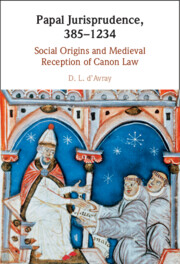Book contents
- Papal Jurisprudence, 385–1234
- Papal Jurisprudence, 385–1234
- Copyright page
- Dedication
- Contents
- Acknowledgements
- Abbreviations
- Sigla
- Introduction
- 1 Transformations and Long-Term Explanations
- 2 The Christian Roman Empire, c. 400
- 3 c. 400: Practical Complexities and Uncertainties
- 4 c. 400: Uncertainty about Grace
- 5 Papal Rulings and Ritual
- 6 Hierarchies
- 7 Clerical Status and Monks
- 8 Returning Heretics
- 9 Pelagianism and the Papacy
- 10 Leo I
- 11 Post-Imperial Syntheses
- 12 Early Papal Laws in the Barbarian West
- 13 Carolingian Culture and Its Legacy
- 14 1050–1150
- 15 Theology and Law
- 16 c. 400 and c. 1200: Complexity, Conversion, and Bigamia
- 17 Clerics in Minor Orders
- 18 Choosing Bishops
- Overall Conclusions
- Book part
- Select Bibliography
- Index
9 - Pelagianism and the Papacy
Published online by Cambridge University Press: 10 March 2022
- Papal Jurisprudence, 385–1234
- Papal Jurisprudence, 385–1234
- Copyright page
- Dedication
- Contents
- Acknowledgements
- Abbreviations
- Sigla
- Introduction
- 1 Transformations and Long-Term Explanations
- 2 The Christian Roman Empire, c. 400
- 3 c. 400: Practical Complexities and Uncertainties
- 4 c. 400: Uncertainty about Grace
- 5 Papal Rulings and Ritual
- 6 Hierarchies
- 7 Clerical Status and Monks
- 8 Returning Heretics
- 9 Pelagianism and the Papacy
- 10 Leo I
- 11 Post-Imperial Syntheses
- 12 Early Papal Laws in the Barbarian West
- 13 Carolingian Culture and Its Legacy
- 14 1050–1150
- 15 Theology and Law
- 16 c. 400 and c. 1200: Complexity, Conversion, and Bigamia
- 17 Clerics in Minor Orders
- 18 Choosing Bishops
- Overall Conclusions
- Book part
- Select Bibliography
- Index
Summary
That papal responses about Pelagianism belong to a specifically legal domain is a secondary conclusion of the chapter. The primary conclusion can be integrated with a central argument about the origins of the first papal jurisprudence, viz., that it was demand-driven, and that the demand was driven by uncertainty. We should not be surprised at uncertainty in late Antiquity about grace and free will when modern scholars write in such different terms about Augustine. Many modern people prefer Pelagius, but Augustine’s understanding of grace won the assent of intellectuals like Gottschalk in the ninth century, Bradwardine in the fourteenth, and Luther and Calvin in the sixteenth, and it continued to have adherents within Catholicism, even after the Council of Trent. Self-evident the solution to the argument was not. Given the violently opposed views, in this apparently purely Western controversy, it is not surprising that the apostolic see was asked for a response. Baffled by the paradox of divine omnipotence and human free will, it did what it would do in subsequent centuries: step back from acceptance of Augustine’s late views, without breathing a word of criticism against him.
Keywords
- Type
- Chapter
- Information
- Papal Jurisprudence, 385–1234Social Origins and Medieval Reception of Canon Law, pp. 96 - 105Publisher: Cambridge University PressPrint publication year: 2022

